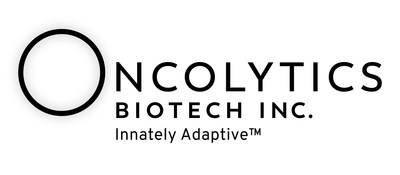Oncolytics Biotech® Reports 2020 Third Quarter Development Highlights and Financial Results
Rhea-AI Summary
Oncolytics Biotech (NASDAQ: ONCY) reported its Q3 2020 financial results, showing a net loss of $6.7 million, compared to $3.5 million in Q3 2019. The company held $26.7 million in cash and cash equivalents. Notable clinical advancements include positive AWARE-1 trial results demonstrating a 14-fold increase in CD8 T cells, with 70% of patients showing an increase in CelTIL. The company is also advancing trials for pelareorep in breast cancer and gastrointestinal cancers, with upcoming data releases expected in Q4 2020 and H1 2021.
Positive
- Q3 2020 AWARE-1 trial showed a 14-fold increase in CD8 T cells.
- 70% of patients in AWARE-1 experienced increased CelTIL.
- Company completed enrollment in the first two cohorts of the AWARE-1 trial.
- Appointment of Dr. Richard Vile to Scientific Advisory Board enhances expertise in oncolytic viruses.
Negative
- Q3 2020 net loss increased to $6.7 million from $3.5 million YoY.
- Operating expense rose to $2.5 million from $1.8 million YoY.
- R&D expenses surged to $3.9 million compared to $1.7 million in Q3 2019.
News Market Reaction 1 Alert
On the day this news was published, ONCY declined 0.47%, reflecting a mild negative market reaction.
Data tracked by StockTitan Argus on the day of publication.
SAN DIEGO, and CALGARY, AB, Nov. 11, 2020 /PRNewswire/ -- Oncolytics Biotech® Inc. (NASDAQ: ONCY) (TSX: ONC) today announced its financial results and operational highlights for the quarter ended September 30, 2020. All dollar amounts are expressed in Canadian currency unless otherwise noted.

"We continue to execute on our clinical and corporate milestones to expand the understanding and clinical benefit of pelareorep," said Dr. Matt Coffey, President and Chief Executive Officer of Oncolytics Biotech Inc. "Clinical AWARE-1 data presented at SITC 2020 demonstrated the ability of pelareorep to reverse immunosuppressive tumor microenvironments and generate the anti-tumor T cell clones needed for a durable anti-cancer immune memory effect. These findings reinforce the survival benefit observed in a prior phase 2 study and bode well for a successful outcome of our BRACELET-1 trial, which rapidly completed its safety run-in phase and continues to enroll patients. We look forward to delivering additional mechanistic, biomarker, and efficacy data before the end of this year to inform the design of our phase 3 registrational program."
Dr. Coffey continued, "Data from the AWARE-1 and BRACELET-1 trials expand the commercial opportunity of pelareorep into additional indications and breast cancer subtypes, and the IRENE trial will answer if pelareorep can bolster the effectiveness of an anti-PD-1 combination treatment in triple-negative breast cancer patients. Likewise, our collaboration with Roche and AIO will drive the GOBLET phase 1/2 trial to determine if pelareorep can boost the effectiveness of Roche's anti-PD-L1 checkpoint inhibitor atezolizumab in patients with difficult-to-treat GI cancers. Together, these trials will define the potential of pelareorep to synergistically combine with checkpoint inhibitors and increase the number of patients responding to such therapies, as well as validate blood-based biomarkers that may facilitate the patient selection process. Finally, the addition of Dr. Richard Vile, a world-renowned expert in oncolytic viruses and immuno-oncology, to our Scientific Advisory Board, positions Oncolytics to expand the clinical applicability of pelareorep within breast cancer and across multiple cancer indications."
Third Quarter and Subsequent Highlights
Clinical Highlights
Presented new AWARE-1 Findings of Pelareorep-Induced Increases in CelTIL and Generation of Anti-tumor T Cell Clones in HR+/HER2- Breast Cancer Patients
Newly announced AWARE-1 data presented at the Society for Immunotherapy of Cancer (SITC) 35th Annual Meeting showed that systemic pelareorep administration led to the generation of new anti-viral and anti-tumor T cell clones and an average 14-fold increase in intratumoral CD8 T cells. Data also showed that
Initiation of Dosing in Phase 2 IRENE Study
The investigator-sponsored study, which represents an expansion of Oncolytics' lead breast cancer program into a new disease subtype, will investigate the use of pelareorep in combination with Incyte's anti-PD-1 checkpoint inhibitor retifanlimab (INCMGA00012) in patients with unresectable locally advanced or metastatic triple-negative breast cancer (TNBC). In addition to investigating the safety and efficacy of pelareorep-anti-PD-1 combination treatment in TNBC patients, IRENE will also evaluate changes in PD-L1 expression and correlations between treatment outcomes and peripheral T cell clonality, a previously identified biomarker of pelareorep response.
Initiated Phase 1/2 GOBLET Study in Collaboration with Roche and AIO
The recently announced multi-center trial will be managed by AIO, a leading academic cooperative medical oncology group based in Germany, and will investigate the use of pelareorep in combination with Roche's anti-PD-L1 checkpoint inhibitor atezolizumab (Tecentriq®) in patients with metastatic pancreatic, metastatic colorectal and advanced anal cancers. The study builds on previously reported early clinical data showing that pelareorep-based combination treatments stimulated an adaptive immune response and led to a greater than
Corporate Highlights
Appointed Richard Vile, Ph.D., to Scientific Advisory Board (SAB)
Dr. Vile, a Professor of Immunology at the Mayo Clinic, is a world-renowned scientist and long-time collaborator of Oncolytics with extensive experience studying pelareorep. Dr. Vile is a recognized key opinion leader whose research focuses on several areas of immuno-oncology, including oncolytic viruses, adoptive cell therapies (ACTs) such as chimeric antigen receptor (CAR) T cells, and potential synergistic interactions between oncolytic viruses and ACTs. In addition to his role as a professor at the Mayo Clinic ("Mayo"), Dr. Vile is the Director of Mayo's Immuno-oncology and Gene and Virus Therapy programs and Co-Director of the Cancer Immunology and Immunotherapy program. He also serves on the editorial board of several prestigious scientific journals, including Molecular Therapy, Gene Therapy, The Journal of Gene Medicine, and OncoImmunology.
Appointed Thomas C. Heineman, M.D., Ph.D., as Global Head of Clinical Development and Operations
Dr. Heineman has extensive experience leading clinical development at biotech companies, most recently serving as Senior Vice President and Head of Clinical Development at Denovo Biopharma. Prior to his time at Denovo, Dr. Heineman served as Vice President and Head of Clinical Development at Genocea Biosciences and Halozyme Therapeutics, where he was also the Head of Translational Medicine. Dr. Heineman's experience further extends into big pharma and academia, as he has previously held roles as Senior Director, Global Clinical Research and Development at GlaxoSmithKline and as an Associate Professor at the Saint Louis University School of Medicine.
Financial Highlights
- As of September 30, 2020, the Company reported
$26.7 million in cash and cash equivalents. The Company raised$3.6 million during the third quarter through the issuing of common stock through our ATM facility. - Operating expense for the third quarter of 2020 was
$2.5 million , compared to$1.8 million in the third quarter of 2019. - R&D expense for the third quarter of 2020 was
$3.9 million , compared to$1.7 million in the third quarter of 2019. - Net cash used in operating activities for the third quarter of 2020 was
$6.1 million , compared to$4.5 million for the third quarter of 2019. - The net loss for the third quarter of 2020 was
$6.7 million , compared to a net loss of$3.5 million in the third quarter of 2019. The basic and diluted loss per share was$0.16 in the third quarter of 2020, compared to a basic and diluted loss per share of$0.16 in the third quarter of 2019.
Anticipated Milestones & Catalysts
- Presentation of new AWARE-1 data and analyses: Q4 2020
- Announcement of final data from phase 2 NU 18I01 second-line pancreatic cancer study*: H1 2021
- Dosing of the first patient in GOBLET study in gastrointestinal cancer: H1 2021
Oncolytics expects to provide updates on the timing of the following milestones over the coming months:
- Announcement of interim data from phase 1 WINSHIP 4398-18 multiple myeloma study
- Interim safety update for phase 2 BRACELET-1 metastatic breast cancer study
- Final biomarker data for AWARE-1 breast cancer study
- Complete enrollment in phase 2 BRACELET-1 metastatic breast cancer study
- Final data for phase 2 BRACELET-1 metastatic breast cancer study
*Guidance provided by clinical investigators
Update on COVID-19
Company Continues to Efficiently Execute Business Continuity Plan
Oncolytics has developed a robust business continuity plan to ensure the safety of patients, employees, and investigators, as well as the productivity of our clinical programs. We expect that the continued execution of this plan will allow the Company to build on the positive momentum of the past two quarters, despite any COVID-19-related challenges that may arise. Moving forward, we plan to remain in contact with relevant stakeholders and keep the market apprised of any new information that may impact clinical timelines.
Webcast and Conference Call
Management will host a conference call for Analysts and Institutional Investors at 5 pm ET today, November 11, 2020. To access the call, please dial (888) 231-8191 (North America) or (647) 427-7450 (International) and, if needed, provide confirmation number: 678-8931. A live webcast of the call will also be available by clicking here or on the Investor Relations page of Oncolytics' website (LINK) and will be archived for three months. A dial-in replay will be available for one week and can be accessed by dialing (855) 859-2056 (North America) or (416) 849-0833 (International) and using reference code: 678-8931.https://produceredition.webcasts.com/starthere.jsp?ei=1399427&tp_key=fb7d246153
About AWARE-1
AWARE-1 is an open label window-of-opportunity study in early-stage breast cancer enrolling 38 patients into five cohorts:
- Cohort 1 (n=10), HR+ / HER2- (pelareorep + letrozole)
- Cohort 2 (n=10), HR+ / HER2- (pelareorep + letrozole + atezolizumab)
- Cohort 3 (n=6), TNBC (pelareorep + atezolizumab)
- Cohort 4 (n=6), HR+ / HER2+ (pelareorep + trastuzumab + atezolizumab)
- Cohort 5 (n=6), HR- / HER2+ (pelareorep + trastuzumab + atezolizumab)
The study combines pelareorep with the standard of care according to breast cancer subtype and atezolizumab. Patients are biopsied on day one, followed immediately by treatment, then again on day three, and a final biopsy after three weeks, on the day of their mastectomy. Data generated from this study is intended to confirm that the virus is acting as a novel immunotherapy and to provide comprehensive biomarker data by breast cancer subtype. The primary endpoint of the study is overall CelTIL (a measurement of cellularity and tumor-infiltrating lymphocytes). Secondary endpoints for the study include CelTIL by breast cancer subtype, safety and tumor, and blood-based biomarkers.
For more information about the AWARE-1 study, refer to https://clinicaltrials.gov/ct2/show/NCT04102618 .
About IRENE
The IRENE (INCMGA00012 and the oncolytic virus pelareorep in metastatic triple-negative breast cancer) study is a single-arm, open-label, phase 2 study evaluating the combination of pelareorep and INCMGA00012 for the treatment of unresectable locally advanced or metastatic triple-negative breast cancer. The study will enroll 25 patients and will be conducted at the Rutgers Cancer Institute of New Jersey and The Ohio State University Comprehensive Cancer Center.
Study participants will receive pelareorep intravenously on days 1, 2, 15, and 16 of 28-day treatment cycles. INCMGA00012 will be administered on day 3 of each cycle, with treatment cycles continuing until disease progression is observed. The co-primary endpoints of the study are safety and objective response rate. Secondary endpoints include progression-free survival, overall survival, and duration of response. Exploratory endpoints include peripheral T cell clonality and pre- vs. post-treatment change in tumor PD-L1 expression.
For more information on the IRENE study, refer to https://clinicaltrials.gov/ct2/show/NCT04445844.
About GOBLET
The GOBLET (Gastrointestinal tumOrs exploring the treatment comBinations with the oncolytic reovirus peLarEorep and anTi-PD-L1) study is a phase 1/2 multiple indication biomarker, safety, and efficacy study in advanced or metastatic GI tumors. The study will be conducted at 25 centers in Germany. The primary endpoint of the study is safety, with overall response rate and blood-based biomarkers (T cell clonality and CEACAM6) as exploratory endpoints. Approximately 55 patients are planned for enrollment across four separate cohorts:
- Pelareorep in combination with atezolizumab, gemcitabine, and nab-paclitaxel in 1st line metastatic Pancreatic cancer patients (n=12);
- Pelareorep in combination with atezolizumab in 2nd and 3rd line metastatic colorectal cancer patients that are diagnosed as MSI high (microsatellite instability) (n=19);
- Pelareorep in combination with atezolizumab and TAS-102 in 3rd line metastatic colorectal cancer patients (n=14); and
- Pelareorep in combination with atezolizumab in 2nd line advanced and unresectable anal cancer patients (n=10).
About Breast Cancer
Breast cancer is the most common cancer in women worldwide, with over two million new cases diagnosed in 2018, representing about 25 percent of all cancers in women. Incidence rates vary widely across the world, from 27 per 100,000 in Middle Africa and Eastern Asia to 85 per 100,000 in Northern America. It is the fifth most common cause of death from cancer in women globally, with an estimated 522,000 deaths.
Breast cancer starts when cells in the breast begin to grow out of control. These cells usually form a tumor that can often be seen on an x-ray or felt as a lump. The malignant tumor (cancer) is getting worse when the cells grow into (invade) surrounding tissues or spread (metastasize) to distant areas of the body.
About Gastrointestinal Cancer
Excluding skin cancers, colorectal cancer is the third most common cancer, with an estimated 104,610 new cases of colon cancer and 43,340 new cases of rectal cancer diagnosed in the U.S. in 20201. Also, for the 2020 year, the American Cancer Society estimates there will be 57,600 new cases of pancreatic cancer2 and 8,590 new cases of anal cancer 3 in the U.S.
About Pelareorep
Pelareorep is a non-pathogenic, proprietary isolate of the unmodified reovirus: a first-in-class intravenously delivered immuno-oncolytic virus for the treatment of solid tumors and hematological malignancies. The compound induces selective tumor lysis and promotes an inflamed tumor phenotype through innate and adaptive immune responses to treat a variety of cancers and has been demonstrated to be able to escape neutralizing antibodies found in patients.
About Oncolytics Biotech Inc.
Oncolytics is a biotechnology company developing pelareorep, an intravenously delivered immuno-oncolytic virus. The compound induces selective tumor lysis and promotes an inflamed tumor phenotype -- turning "cold" tumors "hot" -- through innate and adaptive immune responses to treat a variety of cancers.
Pelareorep has demonstrated synergies with immune checkpoint inhibitors and may also be synergistic with other approved immuno-oncology agents. Oncolytics is currently conducting and planning additional studies in combination with checkpoint inhibitors and targeted therapies in solid and hematological malignancies, as it prepares for a phase 3 registration study in metastatic breast cancer. For further information, please visit: www.oncolyticsbiotech.com.
References:
- "Key Statistics for Colorectal Cancer." The American Cancer Society, American Cancer Society, Inc., https://www.cancer.org/cancer/colon-rectal-cancer/about/key-statistics.html
- "Key Statistics for Pancreatic Cancer." The American Cancer Society, American Cancer Society, Inc., https://www.cancer.org/cancer/pancreatic-cancer/about/key-statistics.html
- "Key Statistics for Anal Cancer." The American Cancer Society, American Cancer Society, Inc., https://www.cancer.org/cancer/anal-cancer/about/what-is-key-statistics.html
This press release contains forward-looking statements, within the meaning of Section 21E of the Securities Exchange Act of 1934, as amended and forward-looking information under applicable Canadian securities laws (such forward-looking statements and forward-looking information are collectively referred to herein as "forward-looking statements"). Forward-looking statements, including the Company's belief as to the potential and benefits of pelareorep as a cancer therapeutic; the Company's expectations as to the purpose, design, outcomes and benefits of its various planned and potential clinical studies; plans respecting the delivery of additional clinical data and the timing thereof; the potential commercial opportunity of pelareorep; the Company's expectations for its collaborations with Roche and AIO; the anticipated impact of additions to our management team and Scientific Advisory Board; the Company's anticipated milestones and catalysts; and the Company's plans in response to the COVID-19 pandemic and other statements related to anticipated developments in the Company's business and technologies involve known and unknown risks and uncertainties, which could cause the Company's actual results to differ materially from those in the forward-looking statements. Such risks and uncertainties include, among others, the availability of funds and resources to pursue research and development projects, the efficacy of pelareorep as a cancer treatment, the success and timely completion of clinical studies and trials, the Company's ability to successfully commercialize pelareorep, uncertainties related to the research and development of pharmaceuticals, uncertainties related to the regulatory process and general changes to the economic environment. In particular, we may be impacted by business interruptions resulting from COVID-19 coronavirus, including operating, manufacturing supply chain, clinical trial and project development delays and disruptions, labour shortages, travel and shipping disruption and shutdowns (including as a result of government regulation and prevention measures). It is unknown whether and how the Company may be affected if the COVID-19 pandemic persists for an extended period of time. We may incur expenses or delays relating to such events outside of our control, which could have a material adverse impact on our business, operating results and financial condition. Investors should consult the Company's quarterly and annual filings with the Canadian and U.S. securities commissions for additional information on risks and uncertainties relating to the forward-looking statements. Investors are cautioned against placing undue reliance on forward-looking statements. The Company does not undertake to update these forward-looking statements, except as required by applicable laws.
Company Contact Kirk Look Chief Financial Officer +1-403-670-7658 | Investor Relations for Oncolytics Timothy McCarthy LifeSci Advisors +1-917-679-9282 |
![]() View original content:http://www.prnewswire.com/news-releases/oncolytics-biotech-reports-2020-third-quarter-development-highlights-and-financial-results-301171282.html
View original content:http://www.prnewswire.com/news-releases/oncolytics-biotech-reports-2020-third-quarter-development-highlights-and-financial-results-301171282.html
SOURCE Oncolytics Biotech® Inc.







